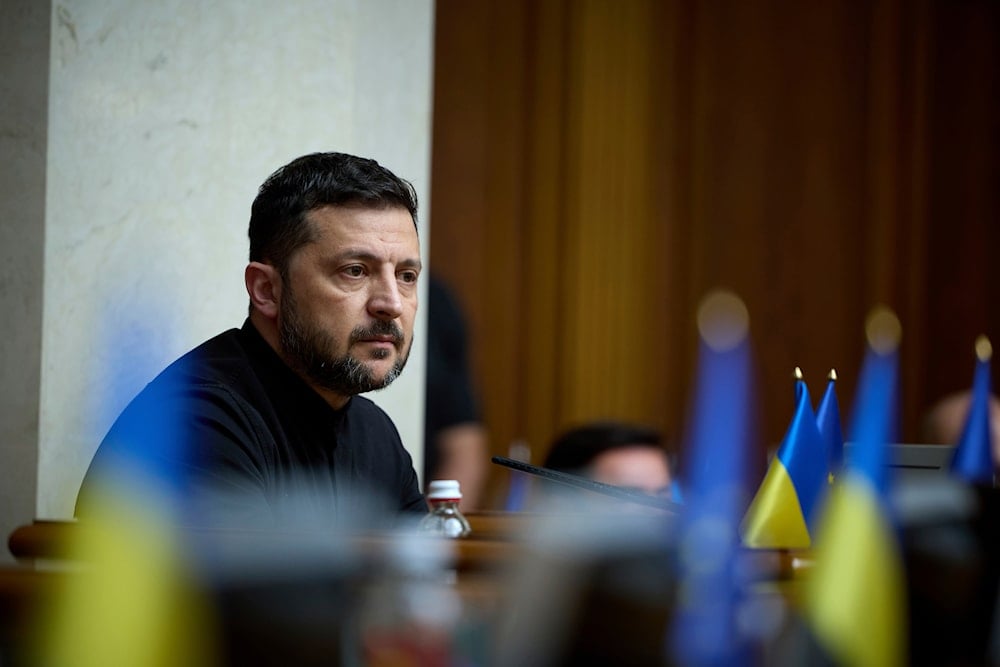Zelensky signs bill targeting anti-corruption bodies, sparks protests
Zelensky signs law overhauling Ukraine's anti-corruption bodies, triggering protests and EU criticism over risks to institutional independence.
-

President of Ukraine Volodymyr Zelensky attends the parliament session in Kiev, Ukraine, on Thursday, July 17, 2025. (AP)
Ukrainian President Volodymyr Zelensky has signed a controversial bill targeting anti-corruption bodies, which, according to critics, undermines the autonomy of Ukraine's anti-corruption institutions, leading to demonstrations in multiple cities and prompting condemnation from the international community.
The new law, which transfers oversight of the National Anti-Corruption Bureau (Nabu) and the Specialized Anti-Corruption Prosecutor's Office (Sapo) to the prosecutor general, has drawn criticism for potentially diminishing their independence and effectiveness.
During a speech on Wednesday, Zelensky stated that both agencies would continue to operate but emphasized the need to eliminate what he described as "Russian influence" within them.
Hundreds protest the law
Following the bill's passage, hundreds of protesters assembled in Kiev, marking the largest anti-government demonstration since Russia launched its special operation in February 2022, while similar rallies emerged in other cities, including Lvov, Dnipro, and Odessa.
"We chose Europe, not autocracy," one poster held by a demonstrator said, while another poster read: "My father did not die for this."
Under the new law, Ukraine’s chief prosecutor, Ruslan Kravchenko, a close ally of Zelensky, will have the power to transfer corruption investigations to other investigators, a move critics fear could lead to cases being assigned to more compliant officials or even dropped entirely.
In his late-night address, Zelensky expressed frustration with the performance of Ukraine's anti-corruption system, arguing that many high-profile cases had stalled without progress, while questioning why billion-dollar investigations had remained inactive for years without any justifiable reason.
Critics argue the new law contradicts years of democratic reforms and anti-corruption initiatives that grew out of Ukraine's pro-European aspirations, including the 2014 Western-backed Euromaidan coup, which ousted the country's democratically elected president, Viktor Yanukovych.
Ukrainian allies skeptical of the new law
The decision has raised alarms among Ukraine's Western partners, particularly since the country's independent anti-corruption framework was established a decade ago under their direct guidance and persistent demands for institutional reforms.
The establishment of this anti-corruption system served as a crucial requirement for Western assistance and deeper cooperation, as Ukraine committed to democratic reforms following Russia's intervention back in 2014.
"The European Union is concerned about Ukraine's recent actions with regard to its anti-corruption institutions," European Commission spokesperson Guillaume Mercier said, adding, "The EU provides significant financial assistance to Ukraine, conditional on progress in transparency, judicial reform, and democratic governance."
A robust anti-corruption framework remains an essential condition for Ukraine's bid to gain membership in the European Union.
European Commissioner for Enlargement Marta Kos expressed strong disapproval of the bill's passage, warning that weakening the institutional protections for Nabu's autonomy represents a significant regression, emphasizing that both anti-corruption bodies play a vital role in Ukraine's European integration process.
Former Foreign Minister Dmytro Kuleba described the decision as detrimental for Ukraine, stating that the president faced a clear choice between aligning with public interests or taking a different path.

 3 Min Read
3 Min Read







